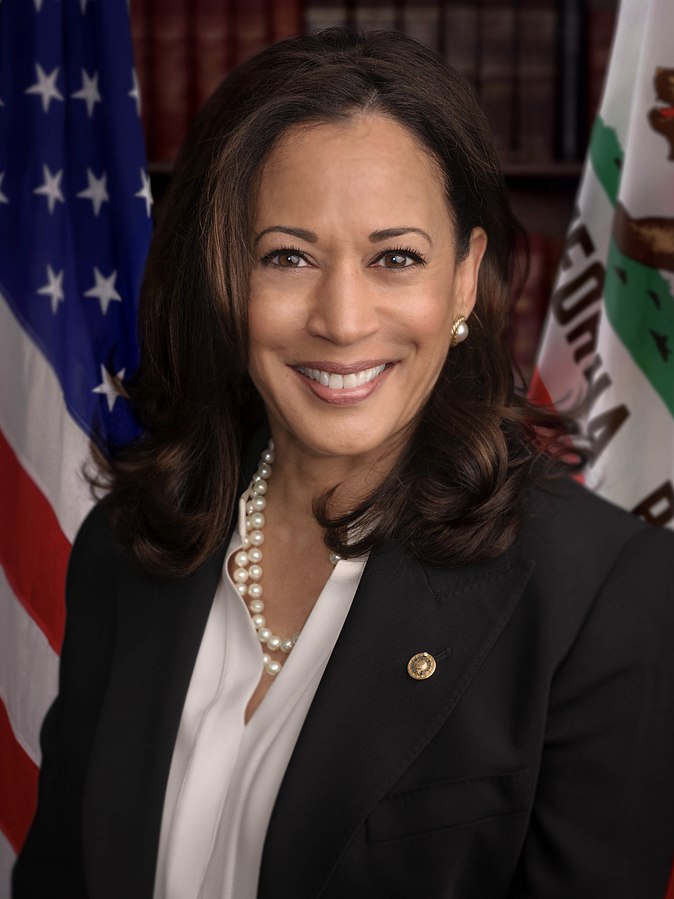I’ve Got My Eye on You, Madam Vice President
Opinion
United States Senate via Wikimedia Commons
Kamala Harris will have to prove her commitment as Vice President.
February 12, 2021
The United States has seemingly taken a massive breath of fresh air as Kamala Harris, an African American, South Asian-American, HBCU graduate, and a woman, reigns as our nation’s new vice president. While these aspects of Harris’s identity are highly notable and appealing—especially towards underrepresented races alike, we must cautiously consider not only the current but also the past ideals and initiatives made by our new VP, as we should for every politician or individual in power.
We can not quietly gloss over what Harris has previously enforced as a government official just because she is outwardly divergent from all of the vice presidents we’ve had before. We have to stop praising leaders simply because we can “identify” with them in some way, and instead hold these people subject to their policies and attitudes to ultimately set them to a higher standard.
Minorities and underrepresented ethnic groups have struggled with attaining justice in communities and school systems for years now. Issues regarding racial inequity must be acknowledged within our current political administration, and in November I knew the exciting results of our recent election would be the start of a change our deteriorating system needed. To me, Harris seemed like a glimmer of light, sneaking through a window waiting to fill the room.
Harris was born in Oakland, California, a city that not only has a crime index of one, according to Neighborhood Scout but also houses a significantly high number of low-income families. Her parents are not only both people of color but also highly educated, her mom a biomedical scientist and her dad an economist. They were both actively involved in the Civil Rights Movement in the 1960s, and Harris, a baby at the time, would join them in protests. They divorced when Harris was seven years old, leaving her mom to raise her and her sister in a more lower-class neighborhood in Berkeley.
Harris was bussed to her elementary school in first grade, as Thousand Oaks Elementary School was only in their second year of integration in 1970 (yes, segregation wasn’t that long ago). After she graduated from high school, Harris went on to attend Howard University, a historically Black university, as I mentioned before. She majored in political science and economics at the university, an ideal fit for her future career as an attorney, senator, and now vice president.
Based on her childhood experiences and interests in college, you would think Harris is all for the progression of racial justice. She has worked her way through a lower-class life and has even considered herself a “progressive prosecutor.” However, after digging a little deeper into her political past, I noticed that she has made several controversial decisions as an attorney general for both San Francisco and the state of California that contradict her so-called “support” and solicitude for people of color.
One of her earliest controversial endeavors as a district attorney would be highly enforcing the Three Strikes Law to prosecute several cases. This law, which has been established in California since 1994, guarantees felons a life-sentence if they have repeatedly been convicted of a crime. These convictions can include anything from murder to petty drug possessions.
Minorities are the main target of this ruling, as African Americans are arrested at a rate about four times as high as white people for drug possessions like marijuana, yet people of both races consume marijuana nearly in the same amounts. This circumstance imposes an undeniable racial bias that hurts the Black community more than anyone else, which is ironic considering Harris is essentially a part of it.
Harris has also been quite reluctant to side with the initiative to defund the police. This could partly be because of the amount of backlash she faced in 2004 when she declined the death penalty to be given to the man who murdered Isaac Espinoza, a San Francisco police officer.
As minorities are constantly attacked by police brutality, the issue of defunding the police has been the ideal approach to help them reclaim their rights and freedoms as citizens. Defunding the police would rework the entire image of law enforcement in the United States in a way that not only benefits African Americans, Hispanics, and Asian Americans, but also many community services. Suspended funds from the police force would provide more money for social services, youth services, violence-prevention programs, education, and healthcare which are essential in all of our lives.
You could say Harris is aiming to be on the police’s “good side” by straying away from this tendentious tactic, but it is far more beneficial for her to consider the lives of her people and what would truly avail them. All that I am looking for in this particular situation is a leader to represent one of the most targeted races in society today. I want someone on our side who is going to represent the marginalized communities in a way that no one else will.
It’s bad enough that in 2015, as Attorney General, Harris resisted Assembly Bill 86, which would have made it a requirement for her office to investigate police-related shootings and encourage body-worn cameras. This bill, proposed by California State Assemblymember Kevin McCarty, was a big step in the right direction to address police brutality.
As a high school student who has undoubtedly struggled with attendance for multiple reasons, I believe one of the most interesting controversies that surround Harris, (and certainly hits home for many) was her views on student truancy. As San Francisco’s District Attorney in the early 2000’s, Harris implemented several uncompromising tactics to prevent the number of absences in the state. By 2009, Harris had already charged twenty parents with infringement.
It wasn’t until 2010 when things really started to get serious, as Harris became Attorney General of California and pushed for a harsh state law that made truancy a criminal misdemeanor. Under that law, several parents of “truant” students (many of them people of color) were arrested and fined up to $2,000, some even facing jail time. The California Department of Education defines a child to be truant if they are “absent from school without a valid excuse for ten percent or more of the school days in one school year.” What many school officials, including Harris, fail to realize is that students, especially from low-income families, face burdens on a regular basis. Instead of penalizing the students and their parents for their struggles, schools should first address issues and work with families to solve them and provide possible solutions or assistance.
Some students may experience personal health issues or issues of a family member. Some students have to work during the school day to help provide for a household. Some students continuously encounter transportation difficulties. Some students may even have the responsibility of taking care of someone else they live with. Ultimately, minority students are more subject to other duties outside of school and therefore should not be deemed guilty if it affects their attendance since they may not be able to go to class all the time.
While Harris’s plan may have had good intentions to keep students on track, it ended up hurting the people she claimed she wanted to help most. It would seem as though, in certain instances, she has more trouble trying to assist minorities than she does putting them at risk. Can we so easily put our trust in a leader who tends to go against what they outwardly stand for?
I initially had a lot of faith in Kamala Harris. When I thought of her a woman of power, honor, and progress came to mind. She has all of the assets, abilities, and amenities to make an amazing change in our country. Despite her utterly contentious past, she absolutely could be the woman who paves the way for people of color and other women looking to hold significant positions. But, in order to do this, Harris must not deviate from her roots and true identity. Authenticity is the key to a successful future for her, and that just might be what she is relatively lacking.



